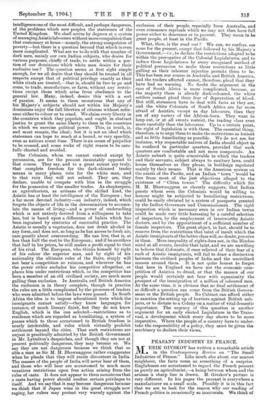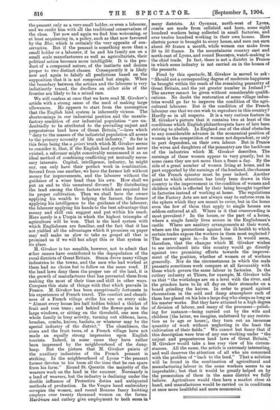AIL ERIK GIVSSOV has written a remarkable article in the Contemporary
Review on "The Small Industries of France." Like much else about our nearest neighbour, the facts come as something of a surprise. Englishmen are accustomed to regard the French peasant as purely an agriculturist,—a being between whom and the artisan a sharp line is drawn. M. Givskov's picture is very different. In his pages the peasant is everywhere a manufacturer on a small scale. Pbssibly it is in this fact that we are to look for the reason why our reading of French politics is occasionally so inaccurate. We think of the peasant only as a very small holder, or even a labourer, and we credit him with all the traditional conservatism of the class. Yet now and again we find, him welcoming, or at least acquiescing in, a policy, such as that now favoured by the Bloc, which is certainly the very opposite of con- servative. But if the peasant is something more than a small holder or a labourer, if he and his family are on a small scale manufacturers as well as agriculturists, their political action becomes more intelligible. It is the pro- duct of a compound nature, of the instincts and desires proper to two distinct classes. Consequently it is likely now and again to falsify all predictions based on the supposition that it is not compound but simple. When the boundary between the artisan and the labourer is very indistinctly traced, the dwellers on either side of the frontier are likely to be a mixed race.
We will confess at once that we have read M. Givskov's article with a strong sense of the need of making large allowances. He appears to start from the assumption that the English land system is inherently vicious. The shortcomings in our industrial position and the unsatis- factory condition of our industrial population "are un- doubtedly to be attributed to the prevailing unjust and preposterous land laws of Great Britain,"—laws which "deny to the masses of the industrial population all access to the primary necessity of life and industry." So far is this from being the a priori truth which M. Givskov seems to consider it, that, if the English land system had never existed, a reformer might conceivably recommend it as an ideal method of combining conflicting yet mutually neces- sary interests. Capital, intelligence, industry, he might say, can only have their perfect work in combination. Severed from one another, we have the farmer left without money for improvements, and the labourer without the guidance of a wiser head than his own. How shall we put an end to this unnatural divorce ? By distributing the land among the three factors which are required for its proper cultivation. Then we shall have the owner applying his wealth to helping the farmer, the farmer applying his intelligence to the guidance of the labourer, the labourer applying his hands to the best advantage that money and skill can suggest and put within his reach. Here surely is a Utopia in which the highest triumphs of agriculture will be won. That is the land system with which Englishmen are familiar, and the fact that it has not yielded all the advantages which it promises on paper may well make us slow to take as gospel all that is promised us if we will but adopt this or that system in its place.
M. Givskov is too sensible, however, not to admit that other causes have contributed to the depopulation of the rural districts of Great Britain. Steam drove many village industries to the towns, and the men who had worked at them had no choice but to follow on the same road. If the land laws deny them the proper use of the land, it is the growth of manufactures that has prevented them from making the most of their time and skill in other ways. Compare this state of things with that which prevails in France. M. Givskov has been exceptionally fortunate in his experiences of French travel. The comfort and cleanli- ness of a French village strike his eye on every side. "Almost every house lies half hidden behind a thicket of fruit and rose trees ; and behind the flower-pots in the large windows, or sitting on the threshold, one sees the whole family in busy activity, turning out ribbons, laces, brushes, combs, knives, baskets, or whatever may be the special industry of the district." The cleanliness, the roses and the fruit trees, of a French village have not made an equally strong impression upon English tourists. Indeed, in some cases they have rather been impressed by the neighbourhood of the dung- heap. But the picture that M. Givskov paints of the auxiliary industries of the French peasant is striking. In the neighbourhood of Lyons "the peasant farmer devotes to his loom all the time that he can spare from his farm." Round St. Quentin the majority of the weavers work on the land in the summer. Normandy is a land of weavers, but the industry is declining under the double influence of Protective duties and antiquated methods of production. In the Vosges hand embroidery occupies the women, and round Roanne fancy knitting employs over twenty thousand women on the farms. Hardware and cutlery give employment to both sexes in many districts. At Oyonnax, north-west of Lyons,_ combs are made from celluloid and horn, some eight hundred workers being collected in small factories, and over twelve hundred working in their own homes. Here electric power is brought to every house, and men can earn about 80 francs a month, while women can make from 30 to 50 francs. In the mountainous country east and north-east of Lyons, and round Besancon, watch-making is the chief trade. In fact, there is not a district in Franca in which some industry is not carried on in the homes of the peasants.
Fired by this spectacle, M. Givskov is moved to ask : "Should not a corresponding degree of moderate happiness be brought within the reach of the remaining peasantry of Great Britain, and the yet greater number in Ireland ? " The answer cannot be given without considerable qualifi- cations. No doubt the restoration of some village indus- tries would go far to improve the condition of the agri- cultural labourer. But is the condition of the French labourer one that we can wish to reproduce in this country? Hardly so in all respects. It is a very curious feature in M. Givskov's picture that it contains two at least of the conditions which English philanthropists have of late been striving to abolish. In England one of the chief obstacles to any considerable advance in the economical position of women is the competition of women not dependent, or only in part dependent, on their own labour. But in France the wives and daughters of the peasantry are the backbone of the industries which M. Givskov describes. The earnings of these women appear to vary greatly, but in some cases they are not more than a franc a day. By the side of a great number of women living at home, and in part supported by the earnings of the husband, the chances of the French spinster must be poor indeed. Another point to which attention has lately been drawn in this country is the improvement in the condition of women and children which is effected by their being brought together in factories instead of working at home. The regulations of the Factory Acts are not always easy to enforce even in the sphere which they are meant to cover, but in the home even the few of them that apply to single houses are seldom.enforced at all. Where is it that overcrowding is most prevalent ? In the house, or the part of a house, where a single family lives secure in the Englishman's castle. Where are sanitary arrangements at their worst, where are the precautions against the ill-health to which certain trades expose the workers in them most neglected ? The answer again is,—In the house. It would seem, therefore, that the changes which M. Givskov wishes to see introduced into this country would go directly against two promising efforts towards the improve- ment of the position, whether of women or of workers generally. Nor do the circumstances in which the male peasants sometimes work compare at all favourably with those which govern the same labour in factories. In the cutlery industry at Thiers, for example, M. Givskov tells us that "the workshops are on a level with the river, and the grinders have to lie all day on their stomachs on a board grinding the knives. In order to guard against rheumatism in the cold and damp atmosphere each of them has placed on his loin a large dog who sleeps as long as his master works. But they have attained to a high degree of division of labour, and many of the processes—polish- ing for instance—being carried out by the wife and children [the latter, we imagine, unfettered by any restric- tion as to age or hours], they turn out an immense quantity of work without neglecting in the least the cultivation of their fields." We cannot but fancy that if this description were true of any one working under "the unjust and preposterous land laws of Great Britain," M. Givskov would take a less rosy view of his circum- stances. All the same, the article is extremely interesting, and well deserves the attention of all who are concerned with the problem of "back to the land." That a solution will be found in the combination of agricultural and manufacturing labour in the same workers seems to us improbable; but that it would be greatly helped on by the prosecution of them in the same district we fully believe. Agriculture would then have a market close at hand, and manufactures would be carried on in condition.s at once more healthful and more economical.







































 Previous page
Previous page